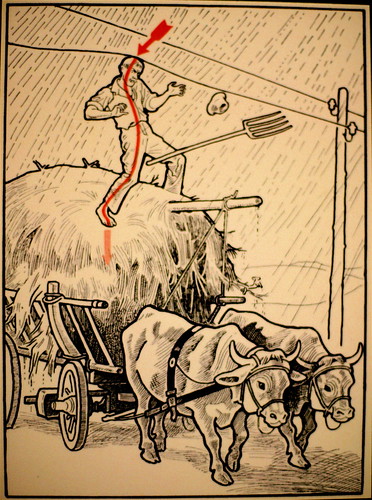One in five, that’s a lot, isn’t it? Less than a quarter maybe, but 20% of most groups, collections or accumulated masses is usually quite a large number. If one in five of, say, all the residents in your neighbourhood suddenly disappeared it wouldn’t take you long to notice the difference. If one in five people suddenly upped and left this country for pastures new pretty much everything would change, everyone would notice. Life in the UK would change considerably and very significantly.
So, in the context of the population of the UK, I’m prepared to stick my neck out here and say that one in five is an unbelievably massive figure. One in five- less than a quarter but not that far short- still one heck of a lot!

If only! Thanks to Cle0patra's photostream
One in five, incidentally, is the number of people deemed to be living in poverty in the UK: thirteen million people, 3.8 million children, 2.2 million pensioners and, get this, 7.2 million working people. This might bring into question the figure at which the minimum wage is currently set- too low perhaps? Either that or else the will to enforce this minimum is sorely lacking.
Six million, now that’s also a lot. Far less open to abuse or misinterpretation as a statistic; whereas one in five rather depends upon the size of the sample to which we’re referring six million is always going to present as being on the large size. Anyway six million, that’s the number of sub-standard houses currently still occupied in the UK. Six million; just to enable you to get your head around this one that's every house in London, and some!
So, one in five people living in poverty and six million sub-standard houses still occupied in the UK. That’s hardly surprising you might- if you’re extremely naïve- be thinking, given that we’re in the midst of one of the biggest recessions in many peoples’ living memories. And, as we’ve already been reminded, far more often than is diplomatically sensitive, ‘we’re all in this together.’
I’m guessing that this is perhaps the ‘light’ in which ‘our’ government would encourage us to view these statistical facts. Somewhat disingenuous this would be, but then, if you’ve taken much of an interest in the machinations of the New Labour machine, you would be most unlikely to expect anything else.
But just in case you might be tempted to go along with this mode of thought, let’s all remind ourselves, shall we, that the good ol’ ‘third way’ thinking UK managed to achieve these targets not during this recession, but during the so called ‘boom’ years that preceded it.
‘Booming’ Britain actually brought about not only a climate in which one in five people might live in poverty and six million occupied homes might slip into a state deemed unfit for human habitation but also the climate in which this horrendous disparity between rich and poor was thought, in many circles, to be a price worth paying.
Just in order to dwell for a little longer within this stench of hypocrisy, ‘we’ created a society where the choice few were left free to accumulate property, land, shares, holidays, yachts and riches beyond all sense of decency, while millions lived in or approaching poverty. Of those who have 'managed' to negotiate a route through a mortgage of maybe five or more times their annual income, without having their home repossessed somewhere along the way, many have watched the cost of living spiral beyond reach, until they could no longer afford to carry out basic repairs upon their own homes. And these were the ‘boom’ years, don’t forget.

Thank you blech's photostream
And now that these ‘days of plenty’ are behind us, suddenly, ‘we’re all in this together.’ Am I the only one struggling to swallow this bovine waste-matter?
A raving idiot- ‘cos that’s what you’d have to be- might have expected ‘our’ Chancellor to claw back some of those millions from the crooks (is it permissable to use this generic term for the city boys?), or for those caught with their fingers in the cookie jar to hang their heads in shame and repay some of those fiddled expenses. I, however, would contest that the term, ‘we’re all in this together,’ entrusted to the wrong lips, will continue to shift ‘seamlessly’ from general population to the outrageously wealthy, or vice versa, as frequently as is deemed necessary in order to ensure that the British people will almost certainly never find themselves in any situation, ‘all together.’

Thank you bre pettis' photostream
If you, like my lovely niece, have spent a significant number of years working in the ordinary ranks of the public sector, you will no doubt recall the New Labour mantra that, ‘we must not allow run away pay rises to damage our ‘booming’ economy.’ Thus, you will also have endured a decade of pernicious pay restraints that sought to deplete your purchasing power, whilst ensuring that those at the top were not to be ‘overly’ burdened by things such as taxes.
Now that the bubble has burst, does it not strike you as a tad unfair to be cited, yet again, as the sacrificial lamb? Don’t forget, ‘we’re all (supposed to be) in this together!’







